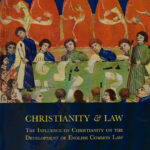
Justice and Forgiveness
Justice and Forgiveness
Written by
Martin Selbrede: Justice and Forgiveness – Recon Quarterly Meeting

[6.11] Love and the Law
[6.11] Love and the Law
Written by Dr. R.J. Rushdoony

[6.10] Taxation
[6.10] Taxation
Written by Dr. R.J. Rushdoony

How Should Christians Respond to Discussions of Racial Injustice?
How Should Christians Respond to Discussions of Racial Injustice?
Written by
In today’s episode, we had the privilege of sitting down with Shatoyia Bradley, a business owner, fashion designer, writer, editor, wife, and mother for a frank discussion about racism, her experience as a black woman in the church and in America, and loving our neighbors in the context of systemic injustice.

Christianity and Law: The Influence of Christianity on the Development of English Common Law
Written by Stephen Perks
The English legal system was formed and developed over centuries under the dominating influence of the Christian religion. The ideals and standards of justice that informed our law were derived largely either from the Bible directly or from ancient pre-Christian customs that have been so completely transformed under the influence of the Church that the original pre-Christian practices from which they originate are no longer discernible in the Christianised forms in which we know them. Our very concepts of justice, due process and the rule of law are Christian ideals that we should never have known had the Christian faith not taken root in England and transformed the nation from a pagan into a Christian society.
This book traces the growth of Christian law in England from the conversion of King Æthelberht, through the reigns of the Anglo-Saxon kings up to the Norman conquest, and examines the influence of Christianity on the development of English common law during its early formative period in the twelfth and thirteenth centuries. The author claims that English common law is today being overturned by legislation passed in Parliament that is based on presuppositions fundamentally alien to our Christian common-law tradition, and that our society is now in transition from a society based on the rule of law, as this has traditionally been understood, to a society ruled by politicians—i.e. a totalitarian society.

[6.9] Military Laws and Production
[6.9] Military Laws and Production
Written by Dr. R.J. Rushdoony

043: What Is the Biblical Response to Our Country’s Large Prison Population?
043: What Is the Biblical Response to Our Country’s Large Prison Population?
Written by
In this Out of the Question Podcast #43, Steve Macias and Andrea Schwartz interview Steve Christenson, a prison chaplain who taught inmates the Law of God and Christian Reconstruction.

[6.8] Restitution or Restoration
[6.8] Restitution or Restoration
Written by Dr. R.J. Rushdoony

[6.7] Responsibility and Law
[6.7] Responsibility and Law
Written by Dr. R.J. Rushdoony

The Institutes Of Biblical Law: Volume 1
Written by R.J. Rushdoony
To attempt to study Scripture without studying its law is to deny it. To attempt to understand Western civilization apart from the impact of Biblical law within it and upon it is to seek a fictitious history and to reject twenty centuries and their progress.
The Institutes of Biblical Law has as its purpose a reversal of the present trend. it is called “Institutes” in the older meaning of the that word, i.e., fundamental principles, here of law, because it is intended as a beginning, as an instituting consideration of that law which must govern society, and which shall govern society under God.
To understand Biblical law, it is necessary to understand also certain basic characteristics of that law. In it, certain broad premises or principles are declared. These are declarations of basic law. The Ten Commandments give us such declarations.
A second characteristic of Biblical law, is that the major portion of the law is case law, i.e., the illustration of the basic principle in terms of specific cases. These specific cases are often illustrations of the extent of the application of the law; that is, by citing a minimal type of case, the necessary jurisdictions of the law are revealed.
The law, then, asserts principles and cites cases to develop the implications of those principles, with is purpose and direction the restitution of God’s order.
